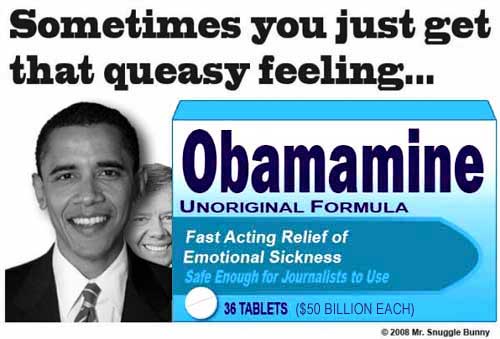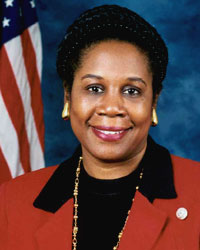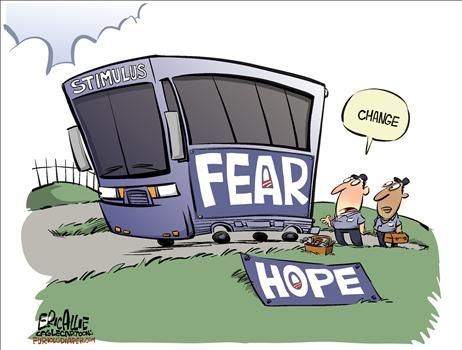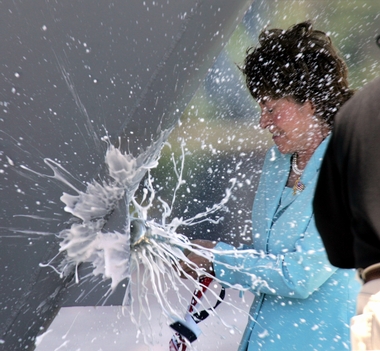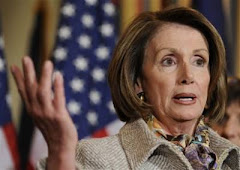
I found an interesting
story today regarding the United States State Department congratulating Venezuela for its most recent support of "democracy" by granting Hugo Chavez "president for life" status via a lifting of term limits. I found this support rather excessively warm since 'Hugo Chavez' and 'democracy' are known antonyms, and it started to occur to me that there are parallels to the early years of Chavez's reign that ring familiar when compared to Obama's.
This in turn caused me to realize that there is perhaps an answer of where we are going as a nation in researching the last ten-year history of Venezuela. Right now Obama has America on its heels because it's in reactionary mode, responding with the speed of concrete shoes while he makes lightning fast decisions, not to mention the fact that America has been politically passive for the most part since the 1960s. Things are flying through because he's taking advantage of our defenses being down, especially among the institutions available to pose any challenges. The court of public opinion, run by the media, worships him. The legislative branch (Congress) is from the same party, so he gets, and will continue to get, a free pass. Who is protecting the regular joes? No one.
Yes, there have been rumblings and jokes about the similarity to Obama's politics and that of Venezuelan dictator Hugo Chavez. But no one's seriously looking into the matter...and that's where this article comes in. I'd like to draw your attention to some concrete and eerie similarities that these two power-seekers have. My theory is that if you understand what Venezuela has been through since Chavez took over in 1999, we have a better chance to read the tea leaves and see where Obama is trying to take America. With this knowledge, it is hoped that we can be better informed and shed light on this agenda before it is irreversibly put into place.
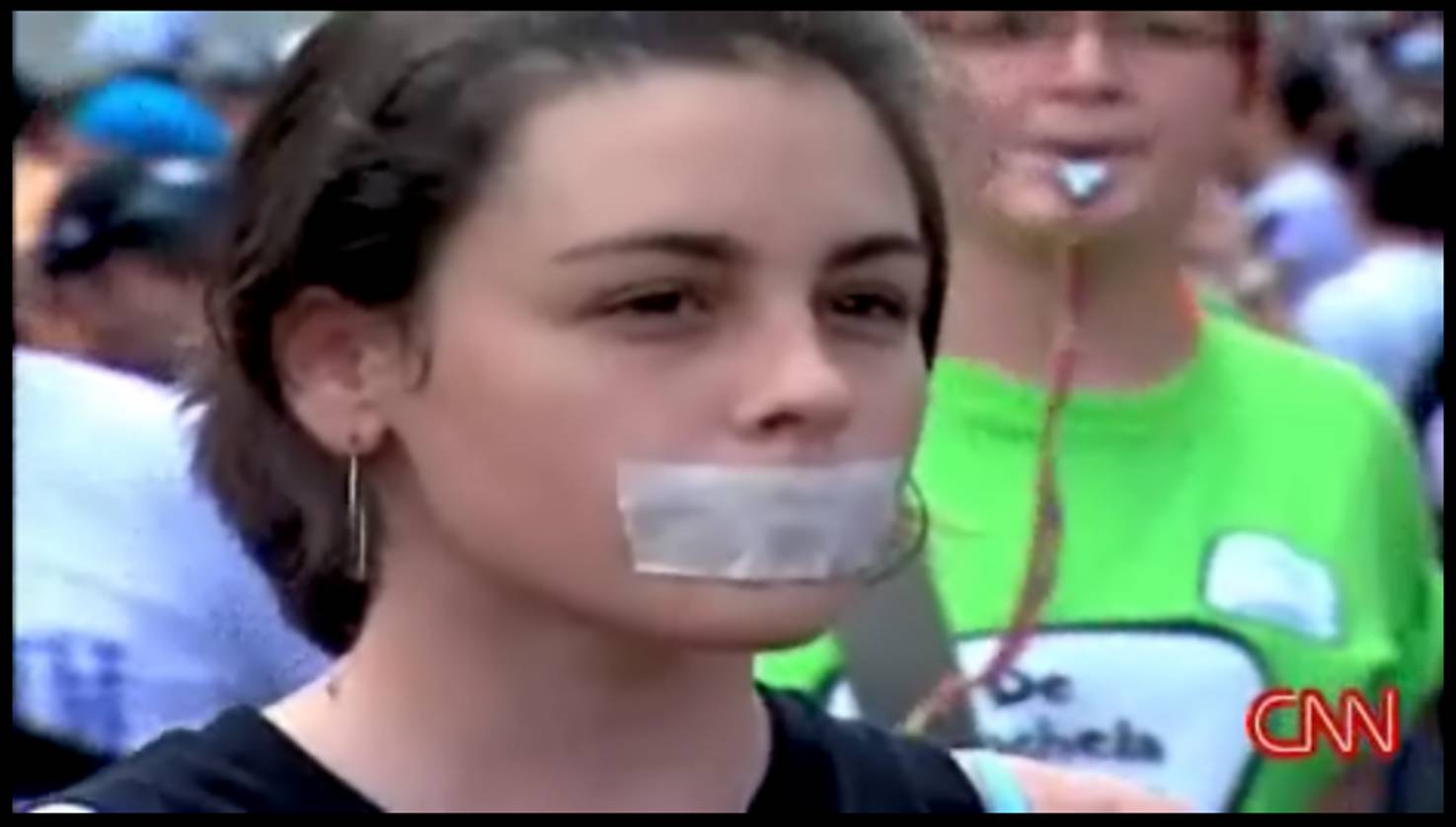
Let's look at Chavez's rise to power and insert any Obama similarities in
bold italics:
Hugo Chavez became president of Venezuela in February 1999. One of his first acts was the launch of "Plan Bolivar 2000" which focused on infrastructural improvements such as roads, housing, and health care.
Um...hello stimulus bill? He campaigned on the demonizing of greedy corporations and landowners and subsequently overhauled Venezuela's tax system to hit these two groups harder.
Another obvious similarity to Obama...I'll admit that this is standard socialist fare, but that's sort of the larger point as well.Only six months into his presidency, Chavez staged a "legislative emergency" in which he appointed a seven-member committee to conduct the affairs of the National Assembly (the equivalent of our Congress), and prohibited the actual elected members of the National Assembly from meeting,
essentially doing away with Venezuela's Congress, as well as its judges under allegations of corruption. This committee then drafted a new Venezuelan constitution, which extended Chavez's term one additional year, introduced a presidential two-term limit (which incidentally was window dressing to appease critics...he would later run for "election" about every year in order to "re-start the clock" on his six-year terms),extended his presidential powers, and most importantly diluted Congress from a two-chamber body (like our House and Senate) to one body. Elections were held the following year and unsurprisingly, Chavez's Socialist Party won most of the seats and judges were appointed to replace the old ones on a "merit-based" system.
Here's what it looks like today. All this have eerie similarities to how Obama enjoys his Democratic House and Senate. But here's another curious thing about Chavez's newly-"elected" National Assembly, according to Wikipedia:
The Legislature under the 1999 Constitution
Under the new "Bolivarian" 1999 Constitution, the legislative branch of Government in Venezuela is represented by a unicameral National Assembly. The Assembly is made up of 165 deputies (diputados), who are elected by "universal, direct, personal, and secret" vote on a national party-list proportional representation system.
An Obama variation of the tactic described above would be to redraw the Congressional districts to put Republicans at a disadvantage with the help of Census 2010 data, thereby helping to pre-determine the outcome of the 2012 elections for House and Senate seats up for re-election or vacant.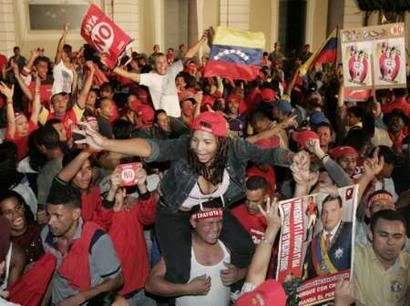
Later in 2000, Chavez backed and won a referendum that forced labor unions to hold state-monitored elections.
Hello...heard of "Card Check"?After his first three years, Chavez had implemented land reform
(i.e. wealth redistribution), nationalized health care
(in the works!!), and free education through college
(on the horizon? Don't forget that he wanted to fund college in exchange for public service a few months back). More importantly, by the time the Venezuelan people got fed up with Chavez, they attempted a coup and a recall vote and they could not get rid of him. An example of the fact that you cannot trust even our own democratic organizations to be forth-right and truthful about honesty and fairness, comes in the form of the
Carter Center, who claimed that Venezuela's recall election was fair and open, though
it was later proven to be anything but (below quote via Wikipedia)...
European Union observers did not attend, saying the government had placed too many restrictions on their participation. While the international observers, and a reluctant Bush administration, endorsed the results, a few critics, including economists Ricardo Hausmann of Harvard and Roberto Rigobon of MIT, alleged that certain procedures in the election may have allowed the government to cheat. The Carter Center admitted Taylor had "found a mistake in one of the models of his analysis which lowered the predicted number of tied machines, but which still found the actual result to lie within statistical possibility."
For your reading pleasure, here is
the final report from the Carter Center regarding the way the Venezuelan Recall Election of 2004 was handled.
Upon his survival from a rigged recall election, Chavez went back to work on his socialist agenda, pushing forward with policies that worked towards wealth redistribution, while finding time to silence his critics through media regulations.
Chavez's version of the Fairness Doctrine.Fast forward to now. Venezuela is in crisis, and the people of Venezuela are about to feel it. They have vested all of their trust and future into this dictator, Hugo Chavez, who has taken the country's resources and distributed them to all citizens...his system provides food, jobs, health care and education. It all sounds well and good in theory, but the Venezuelan people are now completely dependent on this man...and the good times are potentially coming to an abrupt end due to falling oil revenues. He's about to have to make what is likely to be an unpopular decision to cut back on services. Unless of course something unexpected happens, and I think that that unexpected something will come in the form of US aid via the purchase of oil from Chavez.
It all makes sense if you think about it...Obama likely sees a strategic alliance here. What better way to repay the man whose socialist playbook Obama has been plagiarizing from than to help him prevent economic ruin in his country by making some large oil purchases? I regard this recent letter from the US State Department (mentioned at the beginning) actually
PRAISING his continued dictatorship as evidence of an attempt by Obama to curry favor with Chavez. Especially in light of the fact that this lifting of term limits is being done because Chavez finds them an obstacle to ruling until he dies (hardly a democratic principle).
This isn't a new relationship by the way. I direct your memory to last year's election season. Anyone else notice how many Hollywood-types visited Hugo Chavez, no doubt in the name of Obama, who most directly identifies with his extreme left ideology? Let's see there was Danny Glover...

Kevin Spacey...

and Sean Penn...
 whose second visit to Chavez was so well-timed prior to the 2008 American election that you can't help but wonder if he went in the capacity of an unofficial envoy for Obama.
whose second visit to Chavez was so well-timed prior to the 2008 American election that you can't help but wonder if he went in the capacity of an unofficial envoy for Obama.And would-have-been Obama cabinet member Bill Richardson...

Judging by the other company that Chavez keeps...

...it may not be so preposterous for America to unfortunately soon find itself on the same side of global issues with Venezuela and Iran, perhaps (gasp!) even in a strategic partnership if Obama obtains Chavez-size control of the U.S.
I submit to you that it isn't outside the realm of possibility. If we have two politicians who both subscribe to the same socialist ideology, how can we expect two different outcomes?


